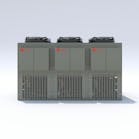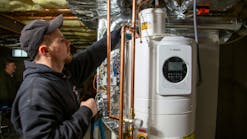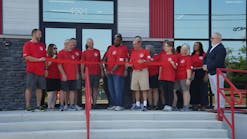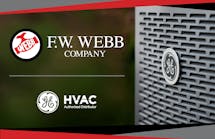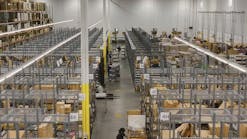When the new 13 SEER standards took effect in January, Nordyne made the transition seamless for its distributors, fulfilling all of its orders for 10 SEER units while moving forward on its production schedule for its new 13 SEER and above product line. Such a successful transition best illustrates why Nordyne is a leader in HVAC manufacturing: The company worked closely with its distributors and dealers to determine their needs and then utilized its high-tech and flexible manufacturing capabilities to ensure that those needs were met.
“We had actively planned for the transition over the past two-and-a-half years, and then we executed those plans,” said Dave LaGrand, president and CEO of Nordyne. “We were able to make that transition pretty quickly, and from our customers' perspective, we were able to serve their 10 SEER needs and then transition to 13 SEER and ship products to them.”
Nordyne, based in O'Fallon, MO, manufactures HVAC products under the Maytag, Frigidaire, Tappan, Westinghouse, Philco, Kelvinator and Gibson brands in the residential market. The company also manufactures and markets light commercial products under the Mammoth brand, and for manufactured housing under the Intertherm, Miller, Broan and Medallion brands. As a manufacturer of such high-profile brands, the company understands the importance of “brand selling,” according to LaGrand, and it works closely with a dealer base that is more focused on selling that value. These dealers know that when they can offer customers a recognized brand, it dramatically improves their closing rates. “These brands come with significant consumer equity,” LaGrand says. “We transfer that to heating and air conditioning, and our dealers can go in with consumers having the expectation of reliability and quality.”
Nordyne supports the expectations of consumers, dealers and distributors by designing and manufacturing high-quality products that feature a wide array of choices within those brands. “So not only can the dealers offer best, better, good, but they have different SEER opportunities — 13, 15, 16, all the way up to 23 SEER,” says Doug Jones, vice president of sales for Nordyne. In a marketplace where dealers and consumers are increasingly looking for HVAC to fit their specific needs, Nordyne continues to perfect its manufacturing capabilities to meet those needs.
The backbone of Nordyne's manufacturing process is Demand Flow Technology, or DFT, which builds and ensures more-flexible and higher-quality products throughout the product line. LaGrand says DFT is “vitally important” to Nordyne's business, impacting virtually all aspects of the company. “What Demand Flow Technology allows us to do is be a little more nimble in reacting to the market in terms of demand, technology and quality,” says Drew Fitzgerald, vice president of marketing for Nordyne. Nordyne first introduced DFT to its manufacturing processes in 1994, and it is the only heating and cooling manufacturer to be DFT-certified.
Demand Flow Technology builds lot quantities as few as one unit at a time. If you toured Nordyne's assembly process, you would see a mixture of models coming down the line. For example you might watch a two-ton unit followed by a four-ton unit. With such variety, there's no such thing as repetitive tasks for the crews on the manufacturing floor. Such work requires proficiency, skill and attention to detail, something that each Nordyne employee brings to the job every day.
DFT also utilizes a three-step process for quality control. Each employee checks the work from the previous work station and then checks his or her own work before the unit is moved to the next station. Each product is computer-automated tested as a final check. Such a system, LaGrand says, “requires employees to be engaged in thinking about what they're doing. It gives us a high level of productivity and quality.”
Because of the flexibility built into DFT, Nordyne can provide a much more rapid response to marketplace demands than other manufacturers. It is this flexibility that allows the company to produce such a breadth of product for each of its brands. This allows the brands to offer several models at the same efficiency level but with different features. “Because it is a just-in-time manufacturing process, it enables us to be more flexible in terms of reacting to market demands,” Fitzgerald says.
Nordyne follows up this flexibility and just-in-time capability with an ability to get its products to distributors and dealers quickly. Electronic continuous inventory replenishment provides real-time restocking of distributor inventories. With the warehouse at its factory, Nordyne also offers its distributors and dealers the flexibility of mixed loads. A distributor may receive a shipment of outdoor sections, air conditioners, heat pumps, coils and furnaces all in the same truckload.
“It's a very convenient way for our distributors to work with us and enables them to achieve a faster turnover of inventory that is way above the industry levels,” LaGrand says.
Nordyne is committed to two-step distribution, according to its executives. In fact, the manufacturer only sells to independent distributors. There are no factory branches, and you will not find Nordyne selling directly to retailers. “Distributors are vital to our organization,” LaGrand says. “We have many long-term relationships with our distributors that we value, and we strive to do everything that we can to provide them with high-quality products, programs and brands that enable them to grow their dealer and customer business.”
Nordyne backs up its commitment to independent distributors with a wide range of programs and services in all aspects of business — from marketing and sales to technical training and tours of its factories. Fitzgerald says the basis for its strong relationship with distributors is the manufacturer's willingness to listen to them. He credits this open communication for the successful transition to 13 SEER. Surveys conducted by Nordyne's marketing department revealed what the distributors planned for the transition to 13 SEER. It allowed Nordyne to work with its suppliers and plan its production schedule well before the transition date so it could fulfill every order.
That was just one example that is part of an ongoing dialogue between Nordyne and its distributor customers, according to Jones. He cites a number of opportunities for distributors and Nordyne to connect with one another, including annual distributor meetings, distributor advisory council meetings and monthly Web-based branding meetings, as well as HARDI meetings and events and regular surveys of distributors, to get their feedback on any number of issues. Customer focus groups are also a regular part of the process to assess the product needs of distributors and dealers. “As our partners, it's extremely important that we are listening,” Jones says. “That's a real key strength.”
Of course, distributors also regularly interact with Nordyne's sales and technical staff. “We have a very active and open technical service group,” says Fitzgerald. Distributors and their dealers can call a Nordyne technician to troubleshoot a particular issue, whether it's an installation or product question. “They get a person right away, and it's someone who's knowledgeable about the products they're selling and can provide them with sound, technical solutions and advice,” Fitzgerald says.
Inside sales representatives have developed tremendous relationships with the distributors, according to Fitzgerald. In addition to the sales staff, Nordyne's brand managers work with the regional sales managers to promote their brands and offer advice, such as best practices, to the distributors. The brand managers are active in training distributors and dealers to work with Nordyne's marketing programs so dealers can represent the brands in the best way possible, according to Jones.
Nordyne's Net Training Program provides distributors with an opportunity to participate in a range of training services. These ongoing programs include training in technical, sales or business practices, and Nordyne brings the programs to them. Distributors often invite their dealers as well as contractors to these trainings. “The technical trainer, for example, will go out and work with the distributor and groups of dealers to understand how to properly install, troubleshoot and service a particular product or category,” Jones says.
“We trust each other,” says Jones, discussing what makes for strong manufacturer-distributor relationships. “We have each other's best interests at heart.” Nordyne's strongest distributors are those that are “passionate” about supporting their dealers, provide ongoing support to the dealers, including marketing programs, and they understand the value that consumer brands bring to their organization, he says.
The manufacturer also continues to use research to help educate their distributors and dealers on what consumers want out of their HVAC systems. As the management team stresses, successful dealers don't sell HVAC systems but whole home comfort. “We see a real opportunity for distributors and dealers to be able to sell the whole comfort solution — higher efficiency, lower energy bills and better indoor air,” Fitzgerald says. “We're trying to make sure that we provide our customers with the tools so they can take advantage of what's happening in the marketplace.”
Nordyne encourages its distributors to hold meetings with its dealers to foster better relationships, and the company's management team plays an active role in these meetings. Nordyne also hosts distributors and their dealers for tours of the factory and headquarters so they can meet employees and gain a deeper understanding of Demand Flow Technology.
Factory tours are a point of pride for Nordyne. Not only do the distributors get to see state-of-the-art manufacturing facilities, but they meet first-class employees who take pride in their work and enjoy meeting with their customers. Jones recalls a recent visit from a distributor who has years of experience in the business. After returning home, he sent an e-mail saying he had never seen such a clean, better operated facility where the employees enjoyed what they were doing and were happy to see customers. “The distributor left thinking this is a different type of organization. We hear those comments frequently,” says Jones.
The employee culture made a huge impression on Jones, who has been with Nordyne for two years. “It's a culture that's geared toward the employees. We look after them, and they look after the company,” he says. “They're passionate about the customers. They've seen the phenomenal growth the company has enjoyed, and they've been an important part of that.” He credits a solid organization where there is clear and effective internal communications that allow the employees to understand where the company is and where it is going.
Nordyne trains its brand managers on the concept of integrity selling, which is similar to what Nordyne itself practices with its distributors. “It's listening, questioning and seeking to understand what your customers' needs are,” Jones says. “We believe in managing those relationships with distributors so we can build stronger relationships and better understand where the marketplace is going.”
Nordyne has been a successful manufacturer for more than 80 years because it has remained focused on building reliable and high-quality products while looking ahead to how it can be even better. For all of its success utilizing Demand Flow Technology, Nordyne continues to insist on refining and improving its manufacturing operations. It can also credit its success to keeping focused on manufacturing and relying on its independent distributors to get the product into homes and businesses. “We think it's difficult to be a great manufacturer, a great distributor and a great dealer at the same time,” LaGrand says. “We have chosen to focus on wanting to be a great manufacturer and we do that very well.”
Michael Maynard is a business writer in Providence, RI, who writes on issues related to HVAC, construction and architecture. Contact him at [email protected].
Andrew Fitzgerald, Residential & Light Commercial Marketing
Douglas Jones, Residential & Light Commercial Sales
William Kormeier, Manufactured Housing Sales & Marketing
Michael Nix, Operations
Allan Reifel, Engineering
Richard Ruth, Human Resources
BEST PRACTICE
Definition and Example: Demand Flow Technology (DFT) manufacturing process. The goals of this manufacturing process are demand-driven production with no in-process inventory and unprecedented levels of product quality against process capability.
Benefits: Helps increase distributor inventory turns; ensures product is quality-checked throughout the manufacturing process to ensure proper operation; increases turnaround time from customer order to fulfillment; allows Nordyne to build to customer demand and efficiently manage raw materials.
Procedure: The following terminology best describes the various techniques used in this process: Total Quality Control (TQC) sequence of events management; Kanban system for material management; flexible forecasts; operation and costing cycle times; employee flexing; and demand-based management. We test-run all products before leaving the plant.
People Involved: Entire organization partakes in some form of this process, from employees on the manufacturing line to sales administration and finance. The certification process passes through various stages, beginning with individual operations' employees, followed by operation shift, entire production line, department and overall facility. To receive certification, each of the areas must exceed 90 percent of its stringent requirements.
Timing: Nordyne began implementing DFT in 1994, and the first certification for all of the facilities occurred in 1997. They were the first HVAC manufacturer to reach the level of complete certification. Nordyne expanded its production capacity to accommodate growth, opening to large plants in recent years. To maintain its quality commitment, Nordyne implemented a recertification process at all plant operations to ensure each operation facility meets the quality standards that have helped Nordyne and distributors grow their businesses significantly during the last decade.
Contact: 636/561-7300/Nordyne Headquarters.
